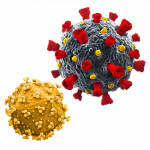People with HIV may want to carefully consider taking gastric reflux drugs from the proton pump inhibitor class, as a recent small study in this population found that PPI use was associated with failure to gain CD4 cells and greater potentially harmful immune activation, aidsmap reports.
PPIs include the medications Prevacid (lansoprazole), Protonix (pantoprazole), Nexium (esomeprazole) and Prilosec (omeprazole). While such medications are considered safe for long-term use, research suggests that they may promote overgrowth of bacteria in the large intestine. Even when well treated, HIV may compromise the integrity of the gut, leading bacteria to pass through the intestinal wall and lead to immune activation.
Through the Veterans Affairs Medical Center, researchers recruited 77 people with HIV who had been taking antiretrovirals (ARVs) for 18 months or longer. Everyone in the group had maintained a fully suppressed viral load for at least 12 months prior to entering the study. Study findings were published in Clinical Infectious Diseases.
Thirty-seven of the participants had taken PPIs for six months or more out of the previous 12 months; the remaining 40 people had not used the gastric reflux drugs. Participants were excluded if they had taken antibiotics during the previous month.
The two groups were well matched except that the PPI users were 59 years old on average compared with 54 years among the non-PPI users, and those on PPIs were more likely to be taking statins or high blood pressure medication.
At the study’s outset, the median CD4 count was 609 among the PPI users and 641 among the non-PPI users. The overall group had been on ARVs for a median of 12 years. Those in the PPI group had been taking that class of drugs for a median of 3.7 years prior to entering the study.
After controlling the data for age, hypertension and statin use, the researchers found that using PPIs was associated with higher levels of a marker of immune activation known as sCD14.
During the year prior to their entry into the study, those on PPIs experienced a median decline in CD4 count of 18, while those not on PPIs gained a median 54 CD4s. The researchers speculated that immune activation drove the differences in these figures.
The study authors concluded that “cautious use of PPIs is advised” among people with HIV until more in-depth research can be conducted looking at the drug class’s long-term effects on larger groups of individuals living with the virus.
To read the aidsmap article, click here.
To read the study abstract, click here.







Comments
Comments